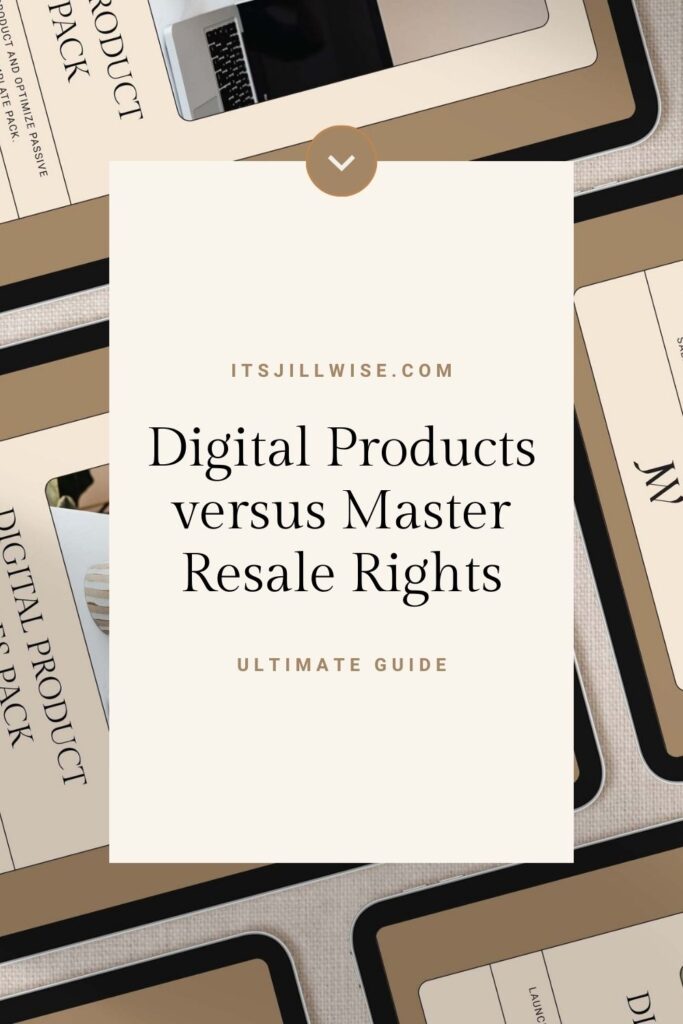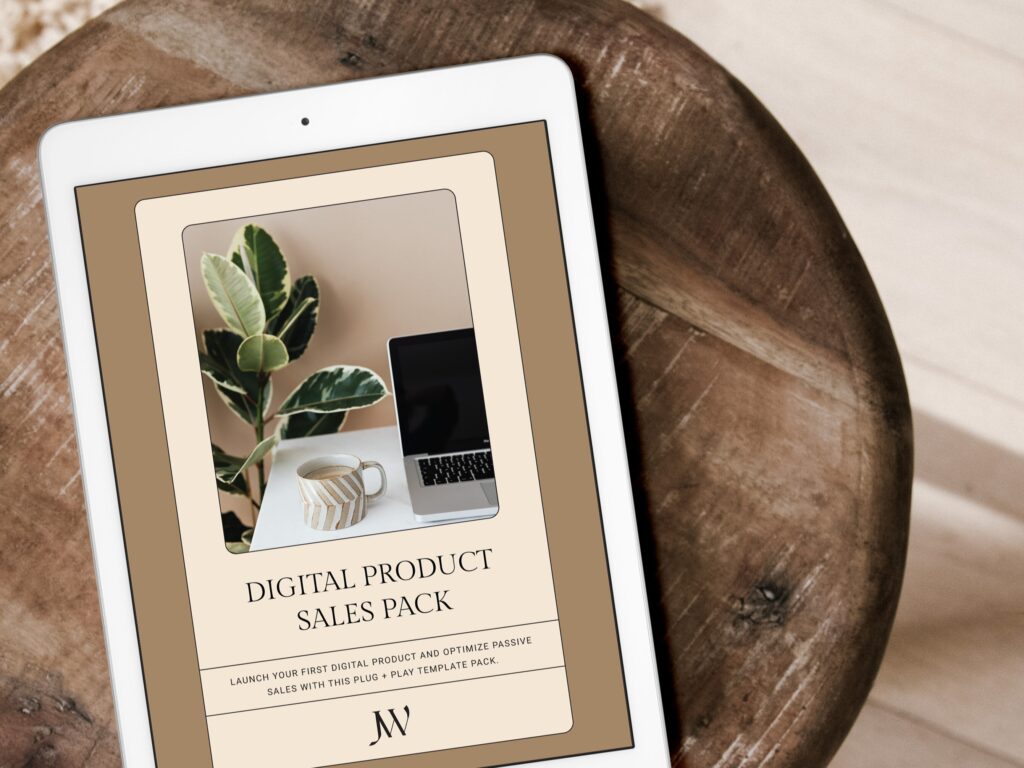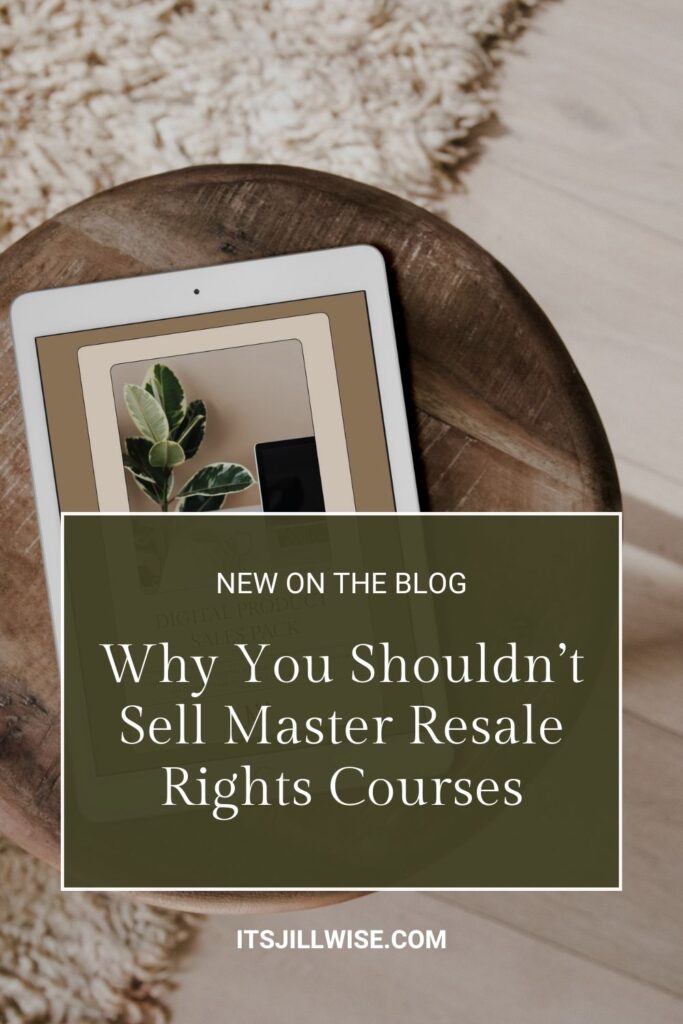If you’re looking for digital products to resell… Don’t. Try this alternative.
Digital products with resell rights are increasingly popular over the last year. It seems like everyone is suddenly a “digital marketer” selling a “digital marketing course.” Unfortunately, this business model aligns a little too closely with the classic MLM structure—you profit off of people purchasing so they can profit off the same content. So if you’re looking for master resale rights digital products, spoiler alert: I wouldn’t recommend building an online business this way.
Why though? Because there’s a better (less scammy, more legit) way to sell digital products online.
In this blog post, I’ll break down all of the following for you:
- The difference between digital products based on your intellectual property and digital products with resell rights.
- Why master resale rights digital products don’t work.
- Digital product ideas to explore by using your intellectual property instead.
- Where to learn how to build and launch your first digital product.

What are master resale rights digital products?
Master resell rights digital products (MRR) are downloads, courses, and other digital content that comes with the rights to resell from the original creator or publisher. Instead of building your own digital product, you can skip that work to get straight to launching and selling ready-to-go digital content.
Master resale rights digital products are promoted as a low-cost, easy alternative to building your own digital products. Essentially, these are the quick fix to tap into another stream of revenue.
The products and business model are also positioned to be “passive” income… Quotations around passive because there’s nothing passive about selling digital products online. It actually requires a lot of work.
Those who sell MRR digital products claim that the structure is not a pyramid scheme or MLM because a licensing fee is just paid once at the time of purchasing the product. I’m not sure if that’s a transparent or fair angle to take.
Your personal digital products versus digital products with resell rights
If you’re here, you’re probably actively researching how to build and sell digital products. Or maybe you just want the tea of why I don’t recommend selling digital products with resell rights.
With that in mind, and the goals of selling digital products for your online business, you’re faced with a decision: What should I sell?
I get why master resale rights digital products can look appealing. Especially if you’re new to the online business world, these digital products are marketed as a “business in a box.” It’s supposed to be a quick and easy way to not only learn how to sell a digital product, but also sell the content that you learned from.
You don’t have to do anything to get started selling. You don’t even need to work through the content you purchased to resell if you don’t want to.
When you choose to build your own digital product, yes, there’s the work of developing the content itself. And you need to figure out how to sell it. But it’s a safe bet to assume that whatever product you build will be something you believe in. Or at least, it should be if you’re launching a digital product. You should believe in the thing you’re sharing with the world.

Why master resale rights digital products don’t work
The challenge with MRR digital products is that everyone else who purchased the same course as you is also now your direct competitor. And a single generic digital marketing course can’t possibly teach you everything you need to know to then teach others.
Your business will end up just another in a saturated market, which makes it even harder to stand out. There’s plenty of sad stories online these days about people who purchased a digital marketing course, or one of the master resale rights digital products, and they just lost money. They haven’t made a single sale. They’ve wasted so much time trying to make something work that just doesn’t align.
Instead, if you choose to build and sell your own intellectual property as a digital product, you’ll have an easier time distinguishing yourself online, building your brand, and therefore selling your digital product.
Costs associated with master resale rights digital products
Many MRR sellers claim that purchasing their master resale rights digital products is low cost. It’s supposed to be a highly profitable business opportunity because you purchase the right to resell just once. Beyond that initial startup cost, they say there’s no ongoing fees.
This is true for licensing the digital products for resale. However, there are costs of running a digital product business.
Some examples of the costs of running a digital product business include:
- Content hosting platform fees, like a course hosting platform
- Marketing platform fees, like email marketing
- Website setup and maintenance
- Bookkeeping, checkouts, and more with processing fees
While yes, selling digital products can be a lean business model, it needs to be clarified that it’s definitely not “no cost” after you purchase the resale rights of a digital product.
Alternative digital product ideas
Digital product ideas if you don’t have a business yet
Hopefully, I’ve convinced you by now that building a digital product from scratch is the better option, regardless of what stage of business you’re in. But what digital product should you sell if you don’t have a business yet? Here’s some ideas…
First, think of what you’re really good at. What are you known for? Maybe you’re great at baking. You could create a digital product that’s a downloadable cookbook. Maybe you’re a very organized person—you could create a digital product that’s your daily planner to motivate others to get on top of their lives too. Maybe you’re great at decluttering and organizing your home? Your digital product could be a mini course teaching others where to start in their decluttering journey. If you’re good at finances, you could sell a budgeting template. If you’re good at cooking from scratch, it could be a meal prep list.
Your first digital product doesn’t need to be massive or complicated… It shouldn’t feel hard to put together. And if you lean into what you already know well, it will be easier to package that insight into your first digital product.
Digital product ideas for freelancers
If you already have an existing business, building and selling a digital product will likely be a lot easier for you. You probably already have at least a small audience. You definitely have transferable skills. And you know people are willing to pay money for the skills you have. Now, your job is to package what you’re known for into a digital product.
Some digital product ideas for freelancers are templates, tools, and courses. For example, if you’re a website designer, you could sell website templates. Or maybe a course about how to build your own website using the platform you build client websites with.
If you’re a copywriter, you could sell copywriting templates. Or an ebook all about how to write copy following your unique formula, and why your formula works best.
If you’re a photographer, you could sell a product that teaches other photographers how to build a profitable photography business.
You can find more digital product ideas for freelancers in this blog post.
Getting started with selling digital products
While I don’t agree with those who claim digital products are a passive stream of revenue that allows sellers to “make money while you sleep,” I do agree that it’s a legitimate business model. And it can pay off for those who are strategic in what they sell, and how they do it.
How to create a digital product to sell
Building a good digital product starts with matching your idea with the best fit audience. Then you can adjust your product to be exactly what your audience needs. From there, you can map out the features or inclusions, then start to build.
This blog post gives you an overview of how to create a digital product. If you’d prefer to watch and listen versus read, I have an entire playlist of digital product how-to videos on YouTube. Check out those videos on my channel here.
I also have a step by step checklist inside of one of my digital products: The Digital Product Sales Pack. This template pack covers all the marketing copy you’ll need to launch your first digital product. The checklist is an extra bonus to help you stay on track as you build out your first and future digital products. It makes it super easy, even if you’re starting from scratch! Because I truly want to make building and selling digital products easier for other people, so you choose to create one based off your personal IP versus doing something like a master resale rights digital product (then don’t see the results you want). The checklist is hosted in Notion, so you can follow along as you build and launch your first digital product.

How to sell a digital product online
To sell your digital products online, you need a checkout and a place to host the content. I’ve shared many times before about how much I love ThriveCart and ThriveCart Learn+ for both my digital checkout and course hosting platform. I’ve tried a handful of course hosting options, both popular and makeshift. I keep coming back to ThriveCart as the best course platform.
For more insight and how I arrived at this opinion, read this blog post.
Beyond the step of how to sell a digital product online, as in how to host and deliver the product, there’s the question of how to get people to buy your product. You absolutely need to focus on audience growth in order to sell a digital product online. Your audience will dictate your revenue: The size, but also their engagement.
If you want to sell a digital product online soon, start building your audience now alongside the process of building your product itself.
Freelance to digital products: How to transition
If you’re already freelancing, you’re in a good position to build a digital product stream of revenue too. You likely already have transferable skills, intellectual property to use, and an audience you can leverage—even if it’s small.
Step 1 to transition from selling freelance services to selling digital products is to choose an idea that aligns with the work you’re already known for. It doesn’t need to be perfect at first, and start with the easy wins.
Read more about how to transition from freelance to digital products here.

Think bigger than master resale rights digital products
Yay for you taking the time to research digital products, and start to think bigger than the flashy sounding master resale rights digital products. You can do so much better than a replica of what everyone else is selling. When done well, you can leverage a brand that sells digital products with ease.
Whatever you choose to do, I’m cheering you on.
Resources to help you work smarter, not harder, as you build your online business
Regardless of whether you choose to do a master resale rights digital product, build your own digital product from scratch, or stick to freelance services, you need to design your business to fit around your life. If you don’t know what I mean by that, or what’s possible for you, check out my free download: The 6-Figure Schedule.
Book an Intensive with me to strategize your sales funnel or optimize your copy: Intensive days are the fast-track for newer creators, freelancers and business owners who need done-with-you support ASAP. I wear either my business strategy, sales funnel strategist, or conversion copywriter hat as you need. Learn more here.
Write consistent, engaging emails to your list: A necessary step if you want to sell digital products is growing your audience. Specifically, an email list. Grab the Newsletter Prompt Pack for 52 copywriting prompts so you can write emails to subscribers every week in 30 minutes or less.
Take advantage of actionable tools inside The Biz Bar: Marketing, copywriting, and business-building resources and training to help you fast-track growth. Browse The Biz Bar here.
Write a website that attracts and converts for your personal brand or business: The Plug-In Website Copy Template Library is a copywriting template pack pulled straight from my Google Drive as a conversion copywriter. Skip all the messy bits of figuring out what to say, and instead just plug your words in (with guidance!) and get back to doing the work you like to do.
Related
Leave a Reply Cancel reply
Leave your info below to join. You'll be added to my email list, but can opt out at any time.

Thanks for the research and clear reasons to start an intellectual product that I can create. You really cleared up some of my thoughts in beginning this process for my future.
happy to help!